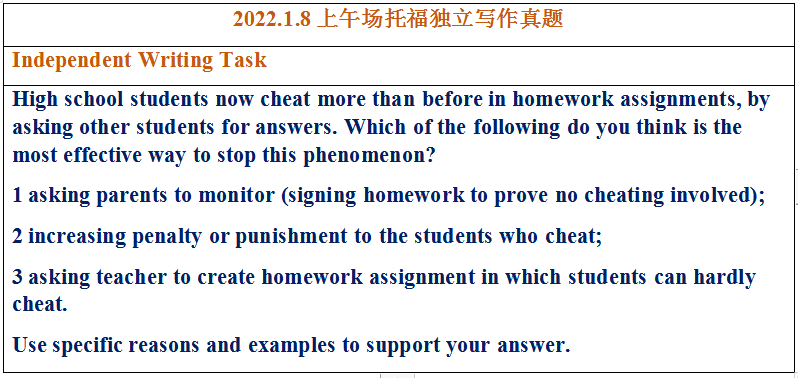
作者:北美考试教学中心 托福写作组 杜薇

Cheating is a very serious behavior in the academic study. In some schools, even a plagiarism committee is organized to prevent students from cheating. However, the real situation is still not very optimistic. Some high school students even cheat more often when they finish their homework assignments. In order to stop this phenomenon, three solutions are proposed. Among them, I think that requiring parents to monitor is the most effective way.
Firstly, if students are supervised by their parents, parents’ engagement will increase. According to experts, only when parenting and schooling are mixed together can students perform the best both in their academic study and in future career prospect. Admittedly, some opponents may argue that some parents are too busy to spare time to engage themselves in their children’s homework. This may be the truth. However, as parents, do they really not have one minute, even just 10 minutes, to care about their children’s study? Even more importantly, what parents should do is not to supervise every assignment but to choose one part of one assignment for checking and signing. In other words, what students should know is the fact that their parents place great emphasis on their study but parents do not want them to cheat to get a good grade. Bear in mind that what teachers and parents care most is their mastery of what teachers have taught in the daytime and homework is a way to check the mastery. After knowing this, the cheating behavior can be eradicated.
Detractors of the abovementioned proposal present an opposite opinion that a better way to prevent cheating from happening is to increase punishment for cheating since it can stir us the fear from the bottom of students’ heart. An enlightening psychology experiment demonstrates that punishment does not work. Punishment does not change the tendency to engage in the behavior that was punished; instead, it makes the person want to avoid the source of punishment. As soon as students think they are not being watched, the tendency to engage in the behavior will reassert itself.
Some argue that the most effective way to counter cheating is for school authorities to create homework assignments or exam situations in which students can hardly cheat, reasoning that if it is the almost impossible for students to cheat, they would definitely give up the intention. Nevertheless, not all assignments can be designed to subjective patterns that are obviously more difficult to cheat such as writing a paper or designing a model. For example, after illustrating the history about the Industrial Revolution, teachers assign some multiple choices to check whether students have mastered the exact time and the flash point of this activity. There is no need to require every student to write an essay. Furthermore, if all assignments are subjective, teachers will spend a large amount of time on correcting and marking. It is not difficult to assume that their time for preparing and updating teaching materials will be reduced, probably resulting in the less effective teaching.
Taking into all the reasons I have mentioned above, asking parents to monitor is the most effective way to stop students’ cheating behaviors.